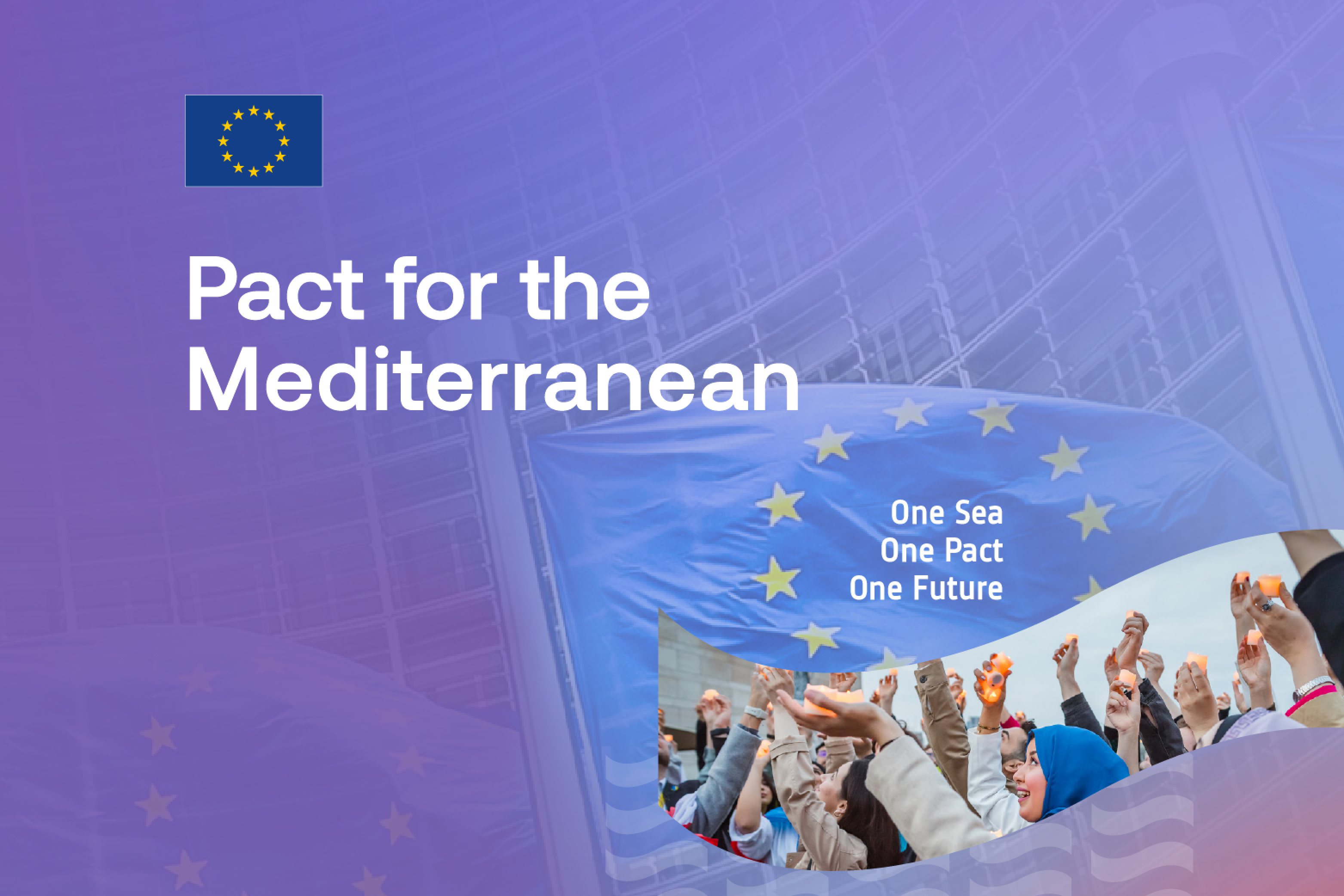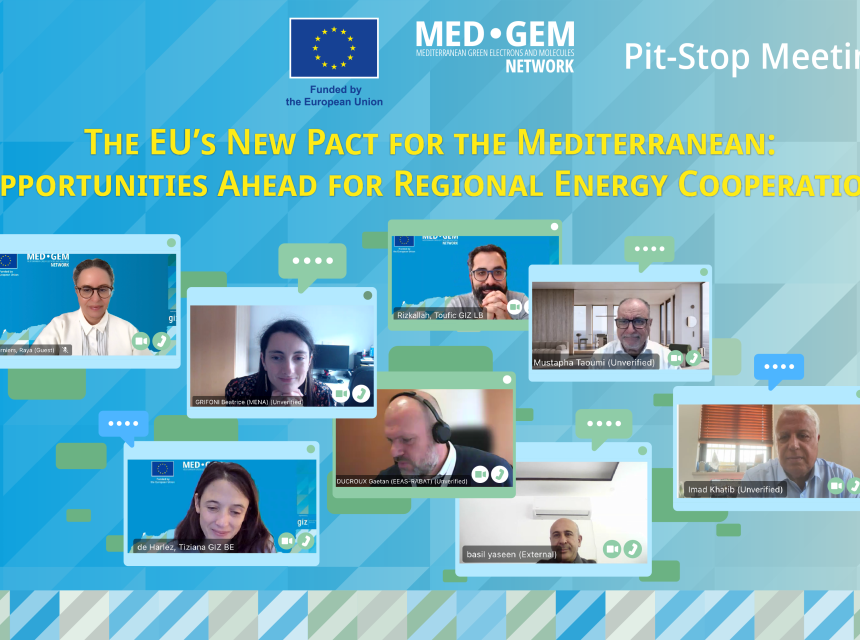The EU's New Pact for the Mediterranean: Opportunities Ahead for Regional Energy Cooperation
Insights from MED-GEM Pitstop Meeting #4
13 November 2025 - Online
As the European Union prepares to inaugurate its new Pact for the Mediterranean (PactMed), the MED-GEM Network dedicated its fourth PITSTOP meeting to exploring the significance of this political and strategic milestone. Bringing together National Focal Points, representatives of energy institutions from across the Southern Neighbourhood, EU Delegations and the MED-GEM regional team, the session offered a unique opportunity to reflect on how this Pact will reshape Euro-Mediterranean cooperation; particularly in the field of energy transition and green hydrogen, where MED-GEM plays a central role.
The meeting was marked by a keynote presentation from Beatrice Grifoni, Programme Manager at DG MENA.A2 (European Commission), who introduced the PactMed and explained how it will frame future cooperation between the EU and Southern Mediterranean partners.
A New Ambition for the Mediterranean Region

Adopted by the European Commission in October 2025, the Pact for the Mediterranean represents the most comprehensive renewal of Euro-Mediterranean relations in decades. Designed jointly by the European Commissioner for the Southern Neighbourhood and the High Representative/Vice-President, it calls for a deeper, more balanced partnership based on trust, shared responsibilities and mutual interests.
Read More:
- Factsheet https://north-africa-middle-east-gulf.ec.europa.eu/pact-mediterranean-factsheet_en
A Mediterranean that delivers for its people, by Dubravka Šuica, Commissioner for the Mediterranean.
At its core, the PactMed introduces the notion of a Common Mediterranean Space, a long-term vision in which peace, stability and prosperity are achieved through closer regional integration. Rather than being a top-down policy, the PactMed is the result of an extensive consultation process. European institutions, Member States, partner governments, civil society, academia, youth organisations, regional organisations and economic actors were all invited to shape its content through bilateral missions, online surveys, thematic workshops, and high-level meetings held between April and June 2025.
This inclusive process underlines the PactMed’s core principle: co-creation. It is designed not as a narrow policy framework but as a shared roadmap that partner countries can adapt to their national priorities, with the flexibility to join or lead specific initiatives according to their interests and capacities.
A Regional Framework Supported by Existing Platforms such as T-MED
One of the strengths of the PactMed is that it does not replace existing regional structures; it consolidates them. Several long-standing cooperation mechanisms, particularly those connected to energy transition, are integrated within the Pact’s architecture.
Among them, the Trans-Mediterranean Renewable Energy and Clean Tech Initiative (T-MED) , which supports regional dialogue on green hydrogen, interconnections, markets and infrastructure, is explicitly recognised as one of the initiatives contributing to the PactMed’s objectives. This is particularly relevant for the MED-GEM Network, who offered a comprehensive presentation on T-MED by Matthieu Craye of DG ENER at the last Steering Committee Meeting in Rotterdam, and whose mandate aligns closely with the PactMed’s aspirations for greener, more competitive and more integrated economies across the Mediterranean.
EU Delegations, including in Morocco, have already begun outreach on the T-MED component of the PactMed, ensuring that national stakeholders are aware of its future role in the region and can contribute to shaping its development.
A Vision Built Around People, Prosperity and Stability
Beatrice Grifoni underscored that the PactMed builds on the 2021 Agenda for the Mediterranean while going much further in scope, ambition and political depth. It envisions a Mediterranean region where people are placed at the centre of the transformation, where economies become more resilient and interconnected, and where security and migration are addressed through shared responsibility and preparedness.
The PactMed foresees, among other flagship initiatives, the creation of a Mediterranean University; an institution with campuses distributed across the region, fostering academic excellence, research mobility, and innovation. It also includes plans for a European Firefighters Hub based in Cyprus, symbolising a renewed approach to regional crisis management.
However, the PactMed does not come with dedicated new financial envelopes. Instead, it defines a unifying political direction under which existing programmes; such as Erasmus+, regional cooperation instruments and energy transition support mechanisms; will converge through a coordinated Action Plan expected in early 2026.
Next Steps: Towards a 2026 Action Plan
The PactMed will be formally presented at ministerial level in late November 2025, during the commemoration of the 30th anniversary of the Barcelona Declaration, held back-to-back with the Union for the Mediterranean Regional Forum.
Its implementation will rely on a two-tier monitoring structure. At EU level, progress will be reviewed every semester at the Foreign Affairs Council, contributing to the annual EU–Southern Neighbourhood Ministerial Meeting. At Euro-Mediterranean level, senior officials from partner countries will meet twice a year to assess progress in the implementation of the upcoming Action Plan.
MED-GEM’s Role in the New Mediterranean Architecture
For the MED-GEM Network, the PactMed offers both a strategic framework and a unique opportunity. By reinforcing regional cooperation, strengthening connectivity and supporting the deployment of clean energy technologies, MED-GEM’s mission to accelerate the green transition across the Mediterranean aligns directly with the PactMed.
The Network will continue to act as a bridge between national energy institutions, EU stakeholders and regional platforms such as T-MED. It will also play a proactive role in ensuring that partner countries’ expertise and priorities are fully reflected in the forthcoming Action Plan.
As the session concluded, participants expressed appreciation for the clarity of the presentation and the importance of keeping technical actors fully informed. With the PactMed entering its implementation phase in 2026, MED-GEM remains committed to supporting regional cooperation; ensuring that the Mediterranean moves forward as one region with one shared future, in line with the values and principles of the European Union.

